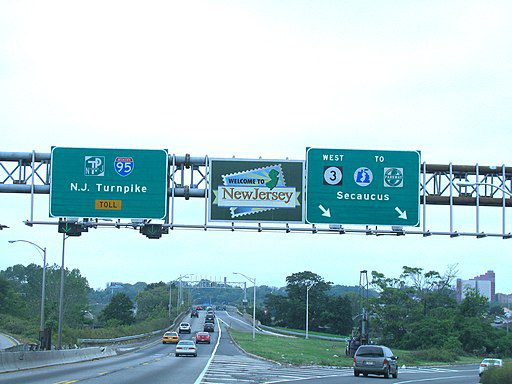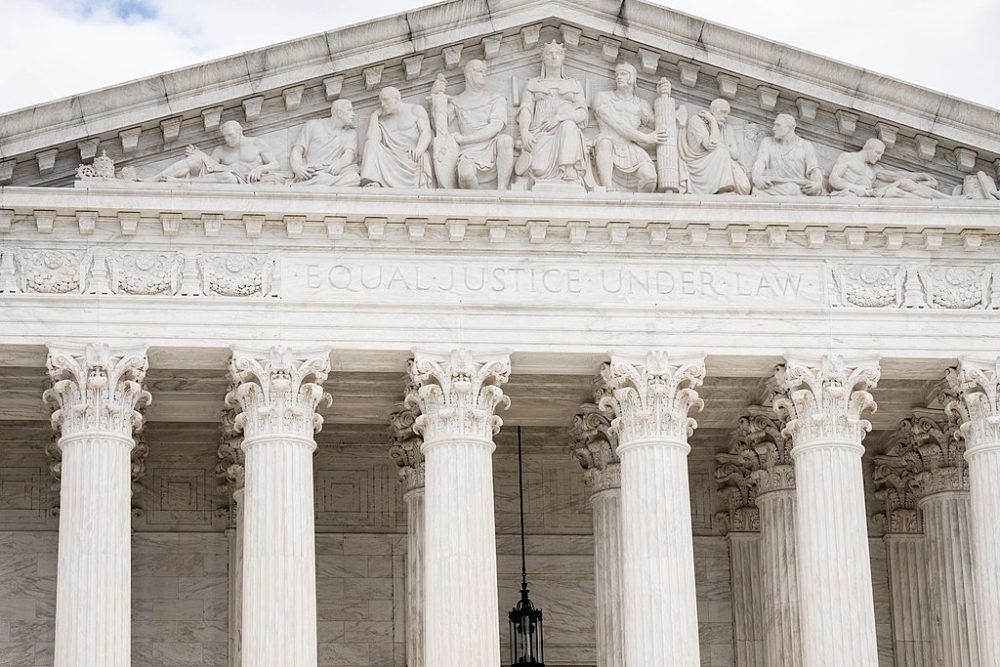
Photo by Collin, CC BY-SA, via Wikimedia Commons
The COVID-19 pandemic has had a devastating economic impact on renters across the United States. Though several states issued moratoriums on evictions earlier this year and the Centers for Disease Control recently ordered a federal eviction moratorium that will last through the end of 2020, these actions have not and will not stop landlords from trying to remove tenants from their homes for nonpayment of rent.
In many cases, the CDC’s nationwide eviction moratorium does not affect a state’s specific eviction moratorium, offering no extra security for tenants who are already facing the threat of being removed from their homes. In all cases, tenants will still owe rent to their landlords, and in many cases landlords can still file eviction complaints in the courts. In New Jersey, for instance—despite a temporary ban on evictions from federally financed properties via the CARES Act, a statewide eviction moratorium for all renters, and suspended eviction court proceedings—30,000 eviction complaints have been filed since March, and many tenants have lost their homes. Tenants’ rights advocates and lawyers say a number of pending eviction cases filed between March and July 25, when the CARES Act protections expired, are in violation of the federal law.
Taking a closer look at what has happened in the Garden State these last several months could provide guidance on how the CDC’s broader eviction moratorium could be better enforced, and what advocates should be paying attention to.
Pre-trial Eviction Settlement Conferences
In March, New Jersey Gov. Phil Murphy issued an emergency moratorium that prevented the lockout or removal of tenants due to an eviction proceeding. The state’s supreme court then suspended eviction court proceedings until further notice unless the case was considered an emergency. (Emergencies include acts of assault or threats against a landlord, if a tenant is acting “disorderly,” or if a tenant commits a civil or drug violation.)
While New Jersey landlords have not been able to pursue an eviction trial they could file formal eviction complaints and pursue online pre-trial settlement conferences. The goal of these conferences is to ultimately settle cases, but tenants often leave them confused and unaware that they do not have to settle.
“There is always a big push either in these conferences or even before these court dates to get tenants to settle,” says Allison Nolan, an attorney with Volunteer Lawyers for Justice of New Jersey, who observed several Zoom-held settlement conferences that took place in late June in two New Jersey counties—Mercer and Burlington.
Both counties had a little over 900 eviction filings in the months of May and June, according to data by the New Jersey Courts. The entire state had 11,440 eviction complaints filed during that two-month time frame, and since then the number has more than doubled to 30,000, according to recent reports.
The federal CARES Act, passed in March, prohibited landlords from filing eviction complaints until July 25 if they had any federally guaranteed mortgage loans; if their tenant(s) received federal rental assistance, such as Housing Choice Vouchers or Section 8; or if they participated in other housing programs meant for seniors and people with disabilities. But a number of tenants’ rights advocates and lawyers say evictions that were filed between March and July 25 were not vetted for compliance with the CARES Act. And it’s not surprising as evictions filed in court before the pandemic were usually not checked for validity in the landlords’ claims, says Nolan.
“If the parties were agreeing to something, the cases were being settled,” says Nolan. “If there is a big problem with the complaint, either the complaint was looking for fees it wasn’t entitled to or [there’s a problem with] how they’re getting to the amount that’s owed that’s not being really looked into.”
Though the CARES Act prevented landlords from filing eviction complaints to protected tenants, it did not penalize landlords who unjustly filed those complaints. If a landlord who was covered by the act filed an eviction complaint against a tenant, the tenant could request to have the case dismissed in court. However, once eviction cases are filed, they can be extremely difficult to remove from the court system and have lasting negative effects on a tenant’s record, even if they were to win the case.
New Jersey advocates and lawyers raised these very concerns with the state’s administrative director of the courts in a June 25 letter. Written on behalf of several tenants’ rights organizations and advocates by Catherine Weiss, partner and chair of the Lowenstein Center for the Public Interest, the letter explained the circumstances surrounding eviction filings.
The letter requested that New Jersey courts require landlords to prove their compliance with the CARES Act by submitting a certification form along with their complaint.
“New Jersey has neither suspended filings nor taken steps to ensure that eviction complaints are in compliance with the CARES Act,” the letter states. “The result is that some unknown proportion of the thousands of eviction actions pending throughout the state were filed in violation of federal law.”
According to a December 2019 report by the Center on Budget and Policy Priorities, 315,700 people in New Jersey use federal rental assistance like public housing and Section 8, of which all were protected by the CARES Act from eviction filings.
Glenn Grant, the acting administrative director of the courts, wrote in a July 28 directive that landlords would be required to file a federal CARES Act Compliance Certification “in all nonpayment of rent cases filed during the CARES Act filing moratorium.”
The certification form, attached to the directive, requires the landlord’s signature agreeing that the rental property is “not a covered dwelling” with the CARES Act and the date of the eviction filing. Besides a signature from the landlord’s lawyer, no other type of verification is needed.
In a second letter, sent Aug. 24 to the Administrative Office of the Courts, Weiss writes that additional action must be taken to ensure that federal law is being followed. Instead of only providing a signature on the certification, Weiss suggests that the certification form also provide several boxes that a landlord must check, such as whether the landlord was given mortgage forbearance, whether the landlord is requesting late fees, and whether the landlord provided the tenant with a 30-day notice—and requiring that the landlord attach a copy of the 30-day notice as well.
The Administrative Office of the Courts has not yet responded to the letter.
Despite the fact that landlords must file certifications of their compliance with the CARES Act, in recent settlement conferences observed by Nolan, there were no discussions about the CARES Act or whether the complaint was valid.
“If a tenant doesn’t show up, if the case defaults, the landlord can then ask a judge for a warrant of removal, but at no point does the court really scrutinize the complaint at all,” says Nolan. “There are all sorts of reasons why some of these complaints could be improper and why, if there was a little more scrutiny, maybe they wouldn’t be getting those judgments.”
Housing advocates in New Jersey want the state’s legislature to pass the “People’s Bill,” which would give tenants six months to pay back each month owed in rent. The bill passed the Assembly in August, but is still waiting to be amended by the Senate.
“For every month that you miss rent, you get six months to pay that rent back,” says Daniel Joseph Wiley, the housing justice manager for the Ironbound Community Corporation in New Jersey, which helped draft the bill. “[The bill is] one thing and that’s not perfect, but that’s just something to make sure tenants have some other type of protection besides the moratorium.”
Confusion in Settlement Conferences
Besides not being able to file eviction complaints against tenants of federally assisted housing or properties that have a federally backed loan, landlords were not allowed to charge fees related to nonpayment of rent.
And yet, according to Nolan, in almost all settlement conferences, tenants are still agreeing to pay built-up late fees, incorrectly believing that doing so is necessary in order to avoid eviction.
In settlement conferences, landlords and tenants usually either agree on a payment plan in which the money owed to a landlord is paid gradually over time by the tenant, or a move-out date is decided for the tenant. If tenants cannot meet the payments agreed to in the settlement, they can then be issued an eviction.
During difficult times like a global pandemic when thousands of working-class Americans have lost their jobs and their future is uncertain, agreeing to a payment plan that effectively raises the monthly rent above what a household is already struggling to afford can ultimately lead to an eviction.
“It’s not that you would be subject to a lockout immediately if you breach any of these agreements, but there’s a sense that it will likely move you up the list,” says Nolan. “If you’ve already entered into a settlement agreement … you’re also then forgoing a trial later on.”
The move to digital settlement conferences because of the pandemic has worsened the already confusing circumstances tenants face when battling evictions. Even before the pandemic, tenants were largely uninformed about what their options are.
There are some attempts to alleviate that confusion. Joe Johnson, a law fellow with the American Civil Liberties Union of New Jersey, has attended several settlement conferences in both Mercer and Burlington counties since they began amid the coronavirus pandemic. According to Johnson, the New Jersey Judiciary launched an informational initiative for tenants and landlords in each of the Judiciary’s 15 court vicinages across the state. Held through Zoom, the webinars provide information on the assistance available to tenants and it is “probably only a matter of time before the rest of the counties start rolling this out,” says Johnson.
Mercer and Burlington counties have also begun to present slide shows at the beginning of settlement conferences, informing tenants of their rights. But some may not grasp what the information means and how settling can affect them negatively—especially if they find themselves continuing to struggle financially.
According to Johnson, the slide show about tenants’ rights has only been presented in English, leaving non-English speakers to rely on the provided interpreters to translate information provided in the Zoom sessions. The American Community Survey states that in 2019, there were 3,544 limited-English–speaking households in Burlington County and 11,081 limited-English–speaking households in Mercer County. In addition, many tenants are unable to attend the online settlement conferences, whether because of no access to a computer, unreliable Wi-Fi, or other technical difficulties. Although tenants are given the option to call in by phone, they then must rely on the judge to read out their rights, and non-English speakers must rely on the court’s translators.
Because of the switch to remote settlement conferences and confusion about the CARES Act, tenants may not know that their landlords were not allowed to issue them an eviction complaint. They almost never have a lawyer to represent them in these cases.
“These conferences, a lot of the time there will be one lawyer who is representing a handful of landlords and 60 tenants on the other side unrepresented who have to go and attempt to negotiate with this lawyer who is going to be sitting there doing it all day for all of these different clients,” says Johnson. “That’s something that is an issue in the regular court system. That’s an issue that’s been huge in New Jersey.”
In addition, advocates and tenants themselves are unsure about whether the settlement conferences are mandatory. It is voluntary for tenants to settle in pre-trial conferences, but according to Johnson, it is unclear if tenants are required to attend.
“So it becomes difficult to even tell folks what the proper thing to do is because it really isn’t cut and dry,” says Johnson. “There’s tons of issues that come in just because of the fact that this is a very new process. It’s a new process for the courts, it’s a new process for the tenants, it’s a new process for the lawyers.”
Further Clarification of Compliance is Needed
In the Aug. 25 letter sent by Weiss and advocates to the Administrative Office of the Courts, landlords who were covered by the CARES Act were asked to give tenants a 30-day notice before filing an eviction.
Some states, like Georgia, Arizona, Maryland, Texas, and Vermont, have similar orders for landlords who were covered by the CARES Act. The New Jersey letter also asks that the courts prohibit landlords from charging fees related to the nonpayment of rent if those landlords were granted mortgage forbearance.
Though New Jersey landlords are asked to certify that the fees being charged are permitted by law, the letter claims “the certification has proved largely ineffective in preventing landlords from charging fees prohibited by law in eviction cases.” One of the reasons for this, the letter claims, is that the certification does not specify what fees are prohibited.
In some other states, including Kentucky, for example, landlords are asked to certify in their eviction filing that the tenant is not being asked to pay fees accrued within the March 27 to July 25 time frame, specifically.
According to Eviction Lab’s COVID-19 Housing Policy Scorecard, New Jersey ranks No. 10 in the United States for the strength of its eviction moratorium. Though considered to be one of the better states, it has not stopped eviction filings completely, which Massachusetts and Washington, D.C., for instance, have.
The state could see about 304,000 eviction filings through the end of November, according to a July report released by the consulting firm Stout and prepared for a coalition of New Jersey housing advocates.
“Any number of evictions, but especially evictions of this magnitude, can have devastating impacts to renter households, the community, the economy, and state and local government budgets,” the report states.
“The courts need to figure out what’s going to happen once the moratorium is lifted,” says Wiley. “The amount of eviction cases that are filed right now versus the amount of eviction cases that were still in the queue before the pandemic—who knows what’s going to happen once the moratorium is lifted.”






I have a tenant who hasn’t payed any rent in 9 months, didn’t call me to work a payment plan, never return my calls, hasn’t payed the water bills which is very high, there could be a major leaking and I can’t even go inn for inspection.
I offered her a payment plan, to pay half of the rent until public health emergency is over and still no payment.
I can’t even sale the house because she won’t let people in to see it, she said because of COVID , she needs to protect her family.
But about two weeks a go she had a big party in the back yard,….what’s going on?
I understand that some tenants are trying to work something out with their landlords and they deserve all the help they can get but some are just taking advantage of the situation.
Something needs to be done about these bad tenants!
Don’t you authorities see that?!
what about the bad landlords? I have paid my rent, on time, in full, for the whole year, using my savings (no income at all this year) and all I’ve gotten is a consistently leaky roof (I don’t even get buckets!), and a toliet/water system that is constantly breaking down. Also, the LL rented a unit downstairs to some drug dealer that plays loud music and runs around the hallways till 2/3am…….. Every tenant is afraid to confront him – and he is looking for a fight.
My reward? An offer to renew my lease at a higher rate!!
I am in the same situation as Lenice Chaves. What makes this even more disheartening, is that my tenants have a higher income than me. They work for Amazon; the Pandemeic never affected them as it relates to employment. Reportedly, they make more money. They are now three months behind in rent and not paying the water and sewer, pursuant to the lease agreement. Their lease ended in October and they refuse to answer any of my phone calls or text message, in an effort to discuss vacating the home or working out a payment plan. Of course their response is that the Governor says they do not have to pay and any communication from me is harassment. My mortgage was increase by $100 as a result of tak and Home Owners Insurance increase. I am about to loose the home since I cannot afford to pay. We have no rights. Everyone needs to stop renting. let the government find homes for these “dead beat” tenants. they are worthless and the Government supports it